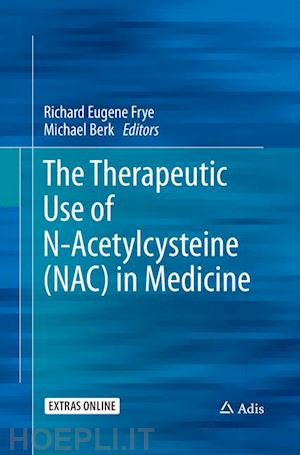
Questo prodotto usufruisce delle SPEDIZIONI GRATIS
selezionando l'opzione Corriere Veloce in fase di ordine.
Pagabile anche con Carta della cultura giovani e del merito, 18App Bonus Cultura e Carta del Docente
Focusing on the practical use of N-Acetyl-Cysteine (NAC) in medicine, this book provides a comprehensive review of the basic biological and clinical studies documenting its benefits in treating medical disease. NAC is perhaps best known as an antidote for acetaminophen, but its therapeutic effect in a wide range of medical diseases has recently been realized. In addition to its well recognized use in radiological contrast prophylaxis for renal disease and pulmonary disorders, studies have suggested significant promise in psychiatric and neurological disorders such as addiction, Alzheimer’s disease, ataxia, autism, bipolar disorder, depression, epilepsy, neuropathy, obsessive-compulsive disorder, schizophrenia, traumatic brain injury and trichotillomania in addition to promising studies in audiology, cardiology, exercise physiology, gastroenterology, hematology, infectious disease, infertility and ophthalmology. Given the promising studies for a wide range of medical conditions, coupled with a excellent safety profile, the potential for NAC in the treatment of human disease appears considerable.
Dr Leonore A Herzenberg from Stanford University, a pioneer of redox physiology and the use of NAC, provides a succinct history of the development of the therapeutic use of NAC for medical disease. This is followed by a series of basic science chapters outlining the role of NAC in important physiological processes, including modulation of dopamine and glutamate neurotransmitter systems, redox and mitochondrial metabolism, apoptosis and inflammation.
The last section of the book is dedicated to clinically oriented chapters that comprehensively review the literature on medical disorders in which NAC has been found to be effective, including toxicity and cardiovascular, gastrointestinal, neurological, psychiatric, pulmonary and renal disorders. Each chapter reviews the theoretical biological mechanisms of NAC for the specific diseases reviewed, rates the clinical studies using a standardized criteria in order to provide an objective level of evidence and grade of recommendation for the use of NAC for specific medical conditions and outlines the ongoing clinical trials examining NAC for the treatment of specific diseases. Final chapters review the clinical evidence verifying that specific theoretical biological mechanisms are actually being targeted by NAC in medical disease. Studies on the pharmacology, formulation and potential adverse effects of NAC are also reviewed. A final chapter synthesizes the clinical studies to suggest that the effectiveness of NAC may signal a new basic physiological disorder, glutathione deficiency, which may be an important pathophysiological mechanism of many diseases.
Dr. Richard Frye is the Chief of Neurodevelopmental Disorders at the Barrow Neurological Institute at Phoenix Children’s Hospital and Professor of Child Health at the University of Arizona College of Medicine - Phoenix.
Professor Michael Berk is a NHMRC Senior Principal Research Fellow, and is Alfred Deakin Chair of Psychiatry at Deakin University and Barwon Health in Melbourne Australia.











Il sito utilizza cookie ed altri strumenti di tracciamento che raccolgono informazioni dal dispositivo dell’utente. Oltre ai cookie tecnici ed analitici aggregati, strettamente necessari per il funzionamento di questo sito web, previo consenso dell’utente possono essere installati cookie di profilazione e marketing e cookie dei social media. Cliccando su “Accetto tutti i cookie” saranno attivate tutte le categorie di cookie. Per accettare solo deterninate categorie di cookie, cliccare invece su “Impostazioni cookie”. Chiudendo il banner o continuando a navigare saranno installati solo cookie tecnici. Per maggiori dettagli, consultare la Cookie Policy.